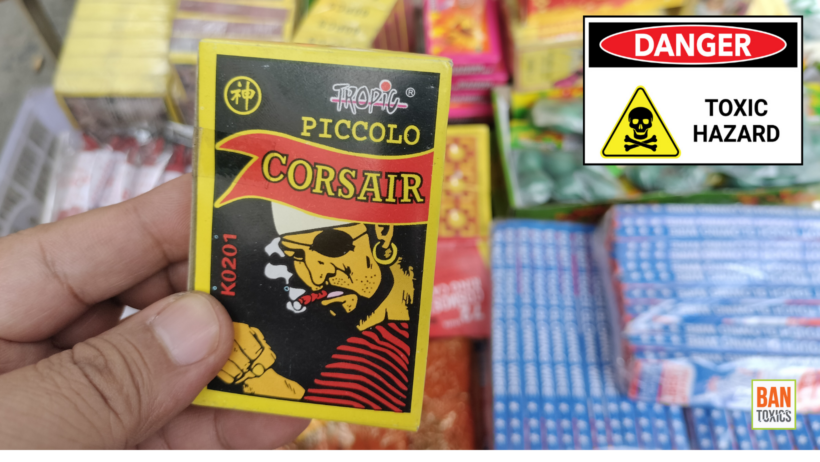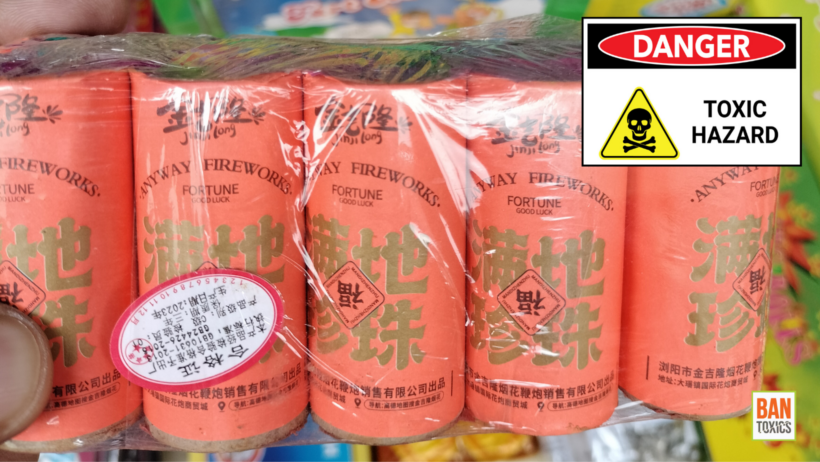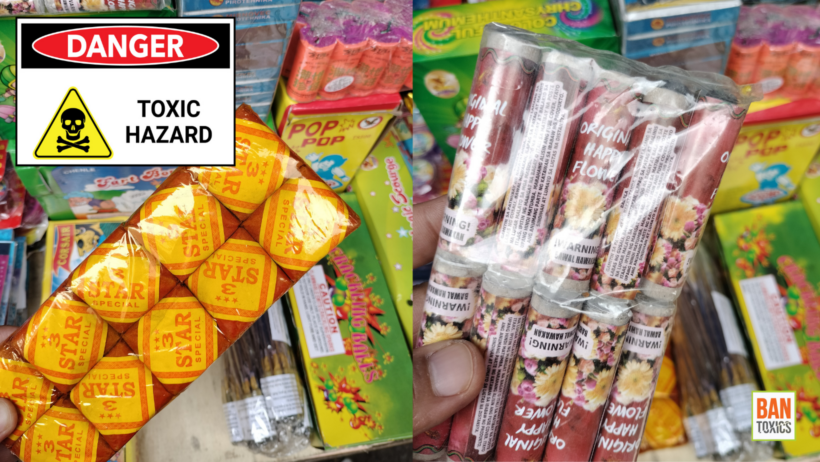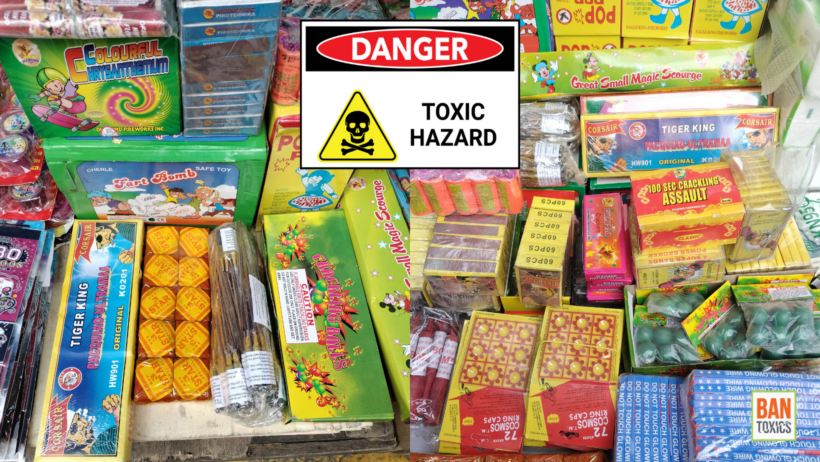Toxic watchdog group BAN Toxics urges the public to say “NO to Firecrackers” to protect and prevent toxic injuries among children over the selling of firecrackers in the market as part of their “Iwas Paputok, Iwas Disgrasya, Iwas Polusyon” campaign. (Avoid Fireworks, Avoid Accidents, Avoid Pollution)
In the recent market monitoring conducted, the group purchased and photo-documented various firecrackers openly being sold in Divisoria, Manila. Among the firecrackers included were crackling balls, crackers, pop pop, happy balls, dynamite, prohibited five star, whistle bomb, and piccolo.
“Firecrackers contain chemicals that are hazardous to human health and the environment,” said Thony Dizon, Toxics Campaigner of BAN Toxics.
According to the Department of Health (DOH), the chemicals and substances present in firecrackers and fireworks are as follows:
a. CADMIUM may produce irritation of the lungs and influenza-like symptoms. If cadmium is inhaled, ingested, or enters the body, it can accumulate and eventually damage the liver and kidneys. It is also a potential human carcinogen.
b. LEAD may affect the hematological profile of a person including the central nervous system and inhibits brain function. Exposure may also lead to developmental delays, growth retardation, behavioral effects, and learning delays.
c. CHROMIUM may cause skin damage and hypersensitivity, nasal mucosa ulceration, and nasal septum perforation. Long-term exposures may lead to lung cancer.
d. ALUMINUM has been noted to cause impaired memory, dementia, and convulsions.
e. MAGNESIUM dust and fumes when inhaled may irritate mucous membranes or the upper respiratory tract and cause mental fume fever and deterioration of the central nervous system.
f. NITRATES, NITRITE, PHOSPHATES, and SULFATES may cause dizziness, abdominal cramps, vomiting, bloody diarrhea, weakness, and convulsions. Small repeated doses may lead to weakness, general depression, headache, and mental impairment. Phosphates may produce an acute effect on the liver, can cause severe eye damage, and may eventually affect the central nervous system. Sulfates are skin and mucous membrane irritant and corrosive; it may cause edema of the lungs and can produce respiratory paralysis.
g. CARBON MONOXIDE (colorless, odorless gas) may cause euphoria, headache, eye irritation, narcosis, and coma, and may be rapidly fatal after the formulation leads to anoxia of the brain, nervous system, and heart.
h. COPPER dust fumes when inhaled may cause irritation in the respiratory tract.
1. MANGANESE DIOXIDE fumes cause lung irritation, and pneumonia, with possible Parkinsonian symptoms, rigidity, muscular pains, and tremors.
j. POTASSIUM irritation may lead to chemical pneumonitis and pulmonary edema. It may cause severe irritation of the upper respiratory tract with cough, burns, and breathing difficulty.
k. SODIUM may cause irritation of the mucous membranes of the nose, throat and respiratory tract.
l. ZINC OXIDE fumes on the lungs may cause mental fume fever symptoms like influenza, chills, fever, sweating, and muscular weakness.
m. OXIDES of NITROGEN and SULFUR may reduce pulmonary function and mucosal irritation. Powerful irritants may cause respiratory damage.
As reported last year, the list of prohibited firecrackers includes piccolo, super lolo, atomic triangle, large judas belt, large bawang, pillbox, bosa, goodbye Philippines, bin laden, goodbye bading, goodbye covid, kwiton bomb, kwiton parachute, mother rocket, lolo thunder, coke in can, atomic bomb, five star, pla-pla, giant whistle bomb, kabasi, and watusi.


Meanwhile, according to Republic Act 7183, the following firecrackers are regulated for sale and use: Baby Rocket, bawang, El Diablo, Judas’ Belt, Paper Caps, Pulling of Strings, Sky Rocket (Kwitis), small triangulo, and other types of firecrackers that are not oversized, not overweight, and not imported.

“We call the attention of the Philippine National Police to initiate on-site inspection and eventual confiscation of prohibited firecrackers in public markets to stop the sale and use to prevent firecracker-related injury, especially among children,” he added.
The group will conduct “Iwas Paputok, Iwas Disgrasya, Iwas Polusyon” awareness-raising activities on the health and environmental impact of firecrackers and fireworks among children in schools and communities in the coming days to support the government’s effort to prevent and reduce firecracker-related injury.
“Through this campaign, we can achieve zero firecrackers and fireworks-related injuries. Initiatives to protect humans and the environment should start at the barangay and community levels. Community support for a toxic-free and waste-free celebration is imperative to push for a safer and healthier celebration of the holiday season,” BAN Toxics added.
Resources:
https://www.officialgazette.gov.ph/downloads/2017/06jun/20170620-EO-28-RRD.pdf










